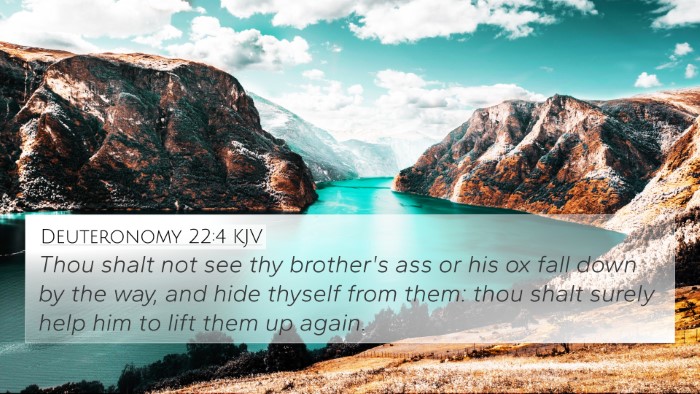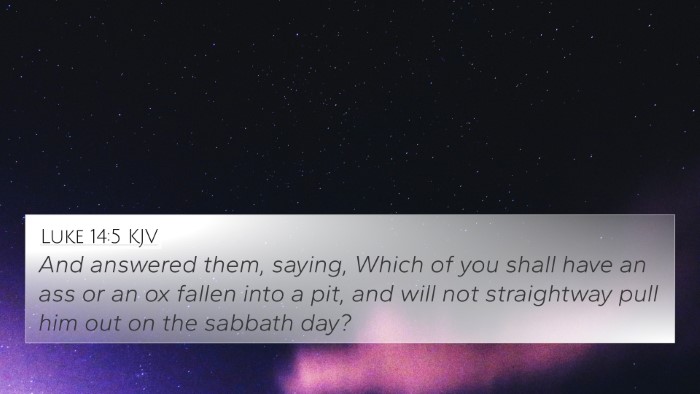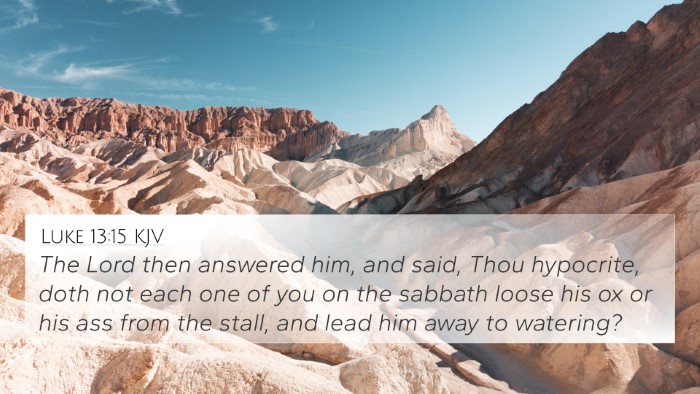Understanding Matthew 12:11
Matthew 12:11 states: "And he said unto them, What man shall there be among you, that shall have one sheep, and if it fall into a pit on the Sabbath day, will he not lay hold on it, and lift it out?"
Verse Meaning and Interpretation
The verse conveys a significant message regarding the value of human life compared to animals, and the nature of the Sabbath law. Here are insights from various public domain commentaries:
Matthew Henry's Commentary
Matthew Henry emphasizes that the intent of the Sabbath law was not to promote hardship or cruelty, but rather to encourage mercy and compassion. He highlights that if men would rescue their sheep from danger on the Sabbath, how much more would God desire to help those in need.
Albert Barnes' Notes
Albert Barnes points out that this statement by Jesus is a clear demonstration of the inconsistency of the Pharisees’ interpretation of the law. He argues that human needs supersede ceremonial laws, and that mercy should be prioritized over ritualistic observance.
Adam Clarke's Commentary
Adam Clarke provides a practical viewpoint, mentioning that the parable illustrates the importance of compassion and action in times of need, regardless of the day. Clarke assures readers that Jesus’ overarching theme revolves around love and mercy, which are the true essence of the law.
Key Themes from Matthew 12:11
This verse draws attention to various themes, including:
- Sabbath Observance: A reminder that the Sabbath should be honored, but not at the expense of humanitarian need.
- Compassion over Ritual: The importance of practical acts of kindness, as opposed to rigid adherence to the law.
- Value of Life: A clear message on the inherent value of life, showing that animals, while significant, do not outweigh the need of a person.
- Humanitarian Law: The implication that God's law was designed to foster life and well-being, not hinder it.
Cross-References to Matthew 12:11
This verse can be linked to several other passages that reinforce its message:
- Exodus 20:10-11 - The commandment regarding Sabbath rest.
- Luke 14:5 - Jesus' similar teaching about rescuing an animal on the Sabbath.
- Mark 2:27 - "The Sabbath was made for man, not man for the Sabbath."
- Matthew 7:11 - Jesus explaining how people know how to give good gifts, implying God's goodness.
- James 2:13 - "For judgment is without mercy to the one who has shown no mercy." A reiteration of the importance of mercy.
- Proverbs 12:10 - "A righteous man cares for the needs of his animal." This acknowledges the balance between caring for animals and human needs.
- Matthew 9:13 - "I desire mercy, not sacrifice." Jesus prioritizes compassion over ritualistic sacrifice.
Insights from Comparative Bible Verse Analysis
This verse can be interpreted through a thematic Bible verse connection lens providing deeper understanding. It serves as a reminder of God's desire for mercy, linking it to broader biblical teachings:
Connections between Bible Verses
In analyzing Matthew 12:11, we discover various connections:
- Matthew 12:7 - "If you had known what this means, 'I desire mercy, not sacrifice,' you would not have condemned the innocent."
- Matthew 25:40 - "The King will reply, 'Truly I tell you, whatever you did for one of the least of these brothers and sisters of mine, you did for me.'
- Galatians 6:2 - "Carry each other's burdens, and in this way you will fulfill the law of Christ."
- Luke 6:5 - Jesus asserted the Lordship over the Sabbath, highlighting authority and mercy.
Tools for Bible Cross-Referencing
To study passages like Matthew 12:11, one may employ various tools:
- Bible Concordance: Helps locate words or themes across verses.
- Bible Cross-Reference Guide: Provides a structured approach to identifying related scriptures.
- Cross-Reference Bible Study: Methods to engage with texts that illuminate context.
- Bible Reference Resources: Compiled materials for comprehensive study across books.
Conclusion: The Impact of Matthew 12:11
Overall, Matthew 12:11 challenges readers to reconsider the nature of their faith and practice, advocating for compassion and mercy as central tenets of Christian living. By engaging in a comparative study of Bible verses, one can uncover the depth of biblical teachings and their relevance to contemporary faith practice.
Further Study
For individuals looking to deepen their understanding, consider these insights on:
- How to find cross-references in the Bible
- Identifying connections between Old and New Testament
- Comparative study of Pauline epistles
- Cross-referencing Bible study methods
- Interpreting Biblical themes through cross-references






